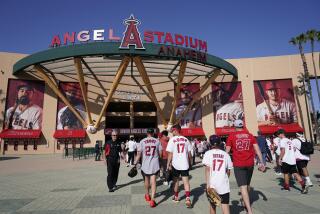Ex-Disney Official Testifies on Intent
- Share via
Calling Anaheim “a small part of a very big place,” the former business strategist of the Walt Disney Co. testified Friday he envisioned the possibility of adding Los Angeles to the Angels’ name a decade ago.
In testimony that directly contradicted two key witnesses for the city of Anaheim in its lawsuit against the Angels, Larry Murphy said Disney never intended that Anaheim would have to remain the only place in the team name.
“I personally was concerned ... it might stymie the growth and development of the franchise,” Murphy said, “and at some point we might have to find a way to incorporate another geographic region -- Orange County, Los Angeles, whatever.”
In response to Murphy’s testimony, Anaheim attorney Andy Guilford said he might call former Disney chairman Michael Eisner as a witness.
The city contends the Angels’ new name -- the Los Angeles Angels of Anaheim -- violates the purpose of a lease provision requiring the team name to “include the name Anaheim therein.”
The primary lease negotiators -- Tony Tavares, then Disney’s sports chief, and James Ruth, then Anaheim’s city manager -- have testified the provision was intended to allow Eisner to call the team the Anaheim Angels, Angels of Anaheim or Mighty Angels of Anaheim, or perhaps to replace Angels with another nickname.
When Angel attorney Todd Theodora asked whether Disney intended to limit the name choices to those, he said, “No.” Murphy said he “led the deal team” as Disney’s chief strategic officer, with Tavares reporting to him.
If lease language is ambiguous, California law permits a jury to determine its meaning by considering the intent of the parties. With Murphy’s testimony, the Angels for the first time have offered evidence that the two parties to the lease do not necessarily agree on the meaning.
However, Guilford said, the law also permits a judge to tell a jury to disregard such evidence, if he determines the intent of one party was not shared with the other during negotiations.
“The unexpressed intent of a party is not relevant to determining the meaning of a contract,” said Sheldon Eisenberg of the Santa Monica law firm Bryan Cave.
Before the trial, Eisner indicated to attorneys on both sides he would be reluctant to testify, but his appearance could resolve the apparent conflicts about what Disney intended.
When Guilford asked whether Murphy was aware the city was told Eisner wanted flexible language solely to accommodate the names above, Murphy said, “I don’t know anything about that.” When Guilford asked whether the city had been told about Murphy’s concern that the geographic reference in the team name might later need to be broadened beyond Anaheim, Murphy said, “I don’t recall.”
Said Ruth on Friday night: “I’m not saying they didn’t discuss it internally, but they sure as the devil never shared it with us.”
Murphy testified Disney did not consider itself bound by baseball tradition in naming the team and wanted “maximum creative flexibility” for itself and a future owner. Arte Moreno bought the team from Disney in 2003 and changed the name last year.
Theodora displayed a 1996 memo from Eisner -- using his code name “Mike Rust” -- in which he wrote, “Angels must be in the name. So must Anaheim. What else?”
Guilford later displayed an internal Disney memo, with a series of proposed names in which only the adjective changed -- Mighty Angels of Anaheim, Avenging Angels of Anaheim, Devilish Angels of Anaheim, Conquering Angels of Anaheim, Fearless Angels of Anaheim and so on.
Theodora had showed another internal Disney memo, written before the one from Eisner, that proposed such names as Pacific Shades, Orange County Breeze, Southern California Surf and Anaheim Gargoyles.
Neither of those lists, Guilford told Murphy, included a name with two geographic references. “You don’t seem to understand there were over 1,000 names generated,” Murphy said.
Guilford asked Murphy for any document, such as a memo to Eisner or an e-mail to city officials, specifying that Disney reserved the right to add a second place to the team name in accord with the lease.
“I don’t know that it’s in writing,” Murphy said. “I know I felt it did that.”
More to Read
Go beyond the scoreboard
Get the latest on L.A.'s teams in the daily Sports Report newsletter.
You may occasionally receive promotional content from the Los Angeles Times.







